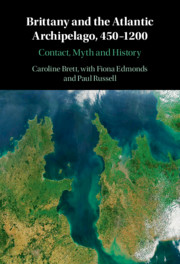Book contents
- Brittany and the Atlantic Archipelago, 450–1200
- Brittany and the Atlantic Archipelago, 450–1200
- Copyright page
- Contents
- Maps
- Tables
- Preface and Acknowledgements
- Abbreviations
- Additional material
- Introduction
- 1 Archaeology and the Origins of Brittany
- 2 Settlement and Isolation, 450–800
- 3 Brittany and Its Insular Past in the Ninth Century
- 4 Insular Contact and the Manuscript-Culture of Brittany in the Ninth and Tenth Centuries
- 5 From Invasion to Conquest: Brittany and Its History, 919–1066
- 6 Saints and Seaways: The Cult of Saints in Brittany and Its Archipelagic Links
- 7 Bretons and Britons in the Norman and Angevin Empires, 1066–1203
- Conclusion
- Bibliography
- Index
7 - Bretons and Britons in the Norman and Angevin Empires, 1066–1203
Published online by Cambridge University Press: 21 October 2021
- Brittany and the Atlantic Archipelago, 450–1200
- Brittany and the Atlantic Archipelago, 450–1200
- Copyright page
- Contents
- Maps
- Tables
- Preface and Acknowledgements
- Abbreviations
- Additional material
- Introduction
- 1 Archaeology and the Origins of Brittany
- 2 Settlement and Isolation, 450–800
- 3 Brittany and Its Insular Past in the Ninth Century
- 4 Insular Contact and the Manuscript-Culture of Brittany in the Ninth and Tenth Centuries
- 5 From Invasion to Conquest: Brittany and Its History, 919–1066
- 6 Saints and Seaways: The Cult of Saints in Brittany and Its Archipelagic Links
- 7 Bretons and Britons in the Norman and Angevin Empires, 1066–1203
- Conclusion
- Bibliography
- Index
Summary
Cultural relations between Brittany and Wales seem to have grown more distant in the ninth to eleventh centuries. The Norman Conquest, involving Bretons alongside Normans, revitalised these connections and in particular greatly raised the profile of Bretons in Wales. The attempt by the clergy of Dol in Brittany to make their see an archbishopric encouraged similar ambitions on the part of the churches of St Davids and Llandaf in south Wales. Sharing of pseudo-historical information between the clergy of Llancarfan (Wales) and Quimperlé (Brittany) created the conditions for Geoffrey of Monmouth to write (by 1139) his hugely influential ‘History of the Kings of Britain’. Geoffrey encouraged the opinion-formers of his time to see the Britons as a single people – not necessarily to the advantage of the Breton elite, who were part of French chivalric society in political fact, but who could be cast in the literary role of ‘barbarians’. This view of the Bretons reached a climax in the 1160s and 1170s when Breton revolt menaced the ‘Angevin empire’ of King Henry II of England, but became less relevant after 1203 when the Breton nobility transferred their allegiance to the king of France. The paths of Wales and Brittany then diverged, to judge by the comparatively slight role that Brittany played in the Welsh learned and literary tradition in the later Middle Ages.
Keywords
- Type
- Chapter
- Information
- Brittany and the Atlantic Archipelago, 450–1200 , pp. 292 - 337Publisher: Cambridge University PressPrint publication year: 2021

